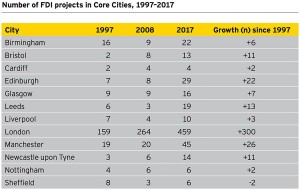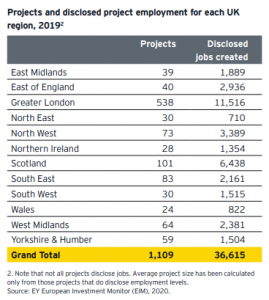Bristol attracted 15 investment projects from overseas last year, new figures show, making it the seventh best performing regional location in the UK and underlining its growing reputation as an international business hub.
The city’s strong performance was despite the South West as a whole suffering a 14% decline in foreign direct investment (FDI) projects in 2019 to a total of 30 the lowest recorded in the region since 2014. 
The figures, from accountancy group EY’s 2020 UK Attractiveness Survey, mean for the first time Bristol accounted for half of all overseas investment in the South West.
This is a marked contrast to 1997, when just 5% went to Bristol and 52% to large towns in the region.
The report examines the performance and perceptions of Europe, the UK and its regions as destinations for FDI.
This year it also includes a survey of 800 international investors looking at the impact of Covid-19 on investment.
As with all other UK regions, the largest proportion of investment into the South West come from the US (33%). The second-largest proportion was from France (27%), with the region attracting five more French projects in 2019 compared to the previous year.
Investment in the South West was led by the business services, with the number of projects nearly doubling year-on-year (from four to seven).
This differed from other UK regions where the digital sector was the most prevalent. In the South West, the digital sector was responsible for the second largest number of projects (four). This represented the lowest number of digital projects since 2013. 
The machinery and equipment sector – joint with transport manufacture – was responsible for the third highest number of projects at three projects each. Each sector declined compared to the previous year – machinery and equipment recorded two fewer projects and transport manufacture recorded one less.
Outside of Bristol, other top South West FDI were Swindon, with three projects, Gloucester (two), and one each in Bath, Falmouth and Plymouth.
EY South West & Wales managing partner Andrew Perkins said: “Whilst it’s great to see Bristol had a strong year in attracting foreign investment, it is important to see other locations in the South West receiving projects if economic ‘levelling up’ is to be shared equally.
“Looking forwards, the business community in the South West will be keeping a keen eye on the path to regional economic recovery following the Covid-19 pandemic.
“The impact on the region’s tourism and hospitality in particular is being felt all too acutely and continuing to attract investment from overseas will become ever more important.”
Across the UK as a whole, there was a 5% increase in inbound FDI projects compared to 2018, ending three years of declining European market share since the EU Referendum.
Investors perceive the UK to be resilient compared to European peers as Brexit fades as an influence on investment decisions.
However, additional research for EY by the Centre For Towns show FDI increasingly going to a small number of large cities, such as Bristol – leaving towns in danger of falling behind.
Ian Warren, Director of Centre For Towns, said: “Whilst we welcome a small increase in FDI projects overall, we are still worried that investment is concentrating in London and our Core Cities. 81% of foreign direct investment to the UK took place in our Core Cities or within 30km of one.
“Our coastal towns in particular have seen their levels of investment plummet over the last two decades, and in the last two years the number of FDI projects has halved in our university towns.
“Equally, whilst the digital sector continues to attract inward investment, this is a sector which also concentrates very heavily in London and the south east of England. Levelling up should include the distribution of digital sector employment across the UK.”
EY chief economist Mark Gregory added: “The UK succeeded in increasing its share of manufacturing projects in a declining European market in 2019, providing some support to towns, but has struggled to spread the benefits of FDI beyond the larger urban centres.
“There’s a similar and even more concerning trend in terms of digital tech investments with 83% of FDI located in the major cities and a further 10% in large towns. Digital rebalancing is a prerequisite for successful levelling up in the UK.”






























